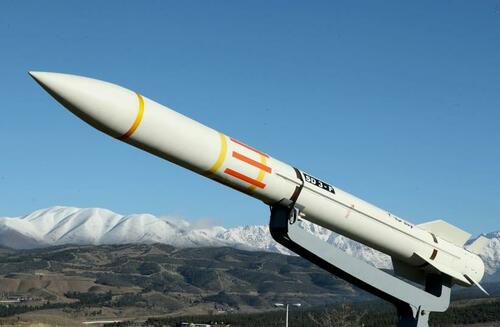Faced with furious US accusations that Iran has supplied Russia with ballistic missiles, Iranian officials in public and private are strenuously denying the claims. A senior Iranian diplomat, speaking to Middle East Eye on condition of anonymity, said Russia has indeed requested military assistance from Iran since the Russian invasion of Ukraine began in February 2022.
"On multiple occasions, Russia has requested military assistance, including ballistic missiles, from Iran. Yet, at the highest levels, Iranian officials have categorically rejected these requests and firmly declined Moscow's appeals," the diplomat said.

On Tuesday, US Secretary of State Antony Blinken said short-range ballistic missiles capable of making a serious impact on the momentum of the Ukraine war had been sent by Iran to Russia. According to Blinken, Russian military personnel were recently in Iran for training on how to operate the weapons, said to be Fath-360 missiles that have a range of 30km to 120km. He did not provide evidence of the alleged transfer.
Blinken also implied that Washington was reconsidering its ban on long-range weapons, like the UK-supplied Storm Shadow missile, being used on attacks deep into Russian territory.
Iranian weapons have already been seen on the Ukrainian battlefield. Since mid-2022, Russia has appeared to use Iranian-made Shahed 136 “kamikaze” attack drones, which the United States and European Union say have been supplied to Moscow regularly over the conflict.
However, the senior Iranian diplomat said these drones were all supplied before the war broke out. "The drones were sold prior to the conflict," he said.
A former senior diplomat who served during the 2013-2021 Hassan Rouhani presidency also said the drones were supplied before the conflict. He said there were suspicions that news of the drone sale was actually deliberately leaked to the western media by Moscow. "The aim was to portray Iran as an accomplice in the Ukraine conflict and to burn bridges behind Tehran," he suggested. "Regrettably, Europe has fallen for this trap and continues to push Tehran closer to Moscow."
On Tuesday, the UK, France and Germany announced sanctions on Iran in response to the alleged transfer of ballistic missiles. "We have been clear that any transfer of ballistic missiles by Iran would face a significant response. Today, alongside our international partners, we are calling out this behavior and its attempts to undermine global security," UK Foreign Secretary David Lammy said.
The senior Iranian diplomat described the accusations and retaliation as "misunderstandings", saying Iran wanted to engage in dialogue with European countries – including Ukraine – to resolve the issues. "Tehran remains open to talks, as it has before, to review the documents and evidence pertaining to the alleged missile transfers in order to clarify the situation," he said.
Officially denying Blinken’s allegations, Iran’s foreign ministry said it had a neutral stance on the Ukraine war. "The Islamic Republic’s position on the Ukraine conflict has been consistent and principled. The recurring claims of missile transfers to Russia are driven by certain western countries with specific political motivations and objectives," foreign ministry spokesperson Hossein Kanaani said.
Pushing Tehran and Moscow together
This fresh downturn in Iranian relations with the West comes soon after the election of Masoud Pezeshkian, a member of Iran’s reformist political camp who campaigned promising to pursue better ties with western countries. A prominent Iranian foreign policy analyst, who frequently writes for reformist media, believes the West's approach to Iran has inadvertently strengthened the ties between Tehran and Moscow.
"Initially, I questioned why western countries were pushing Tehran into Russia's arms, especially when there was a real opportunity to improve relations with Iran under the new administration of President Pezeshkian," the analyst told MEE. "It now seems clear that the allegations about Iran sending ballistic missiles to Russia are part of a larger narrative designed to create a pretext for arming Ukraine with long-range missiles."
Western media, including CNN and Sky News have featured the following claims on Thursday:
In his view, this strategy could backfire in the long term. "Ultimately, this approach will serve Russia's interests by preventing any potential rapprochement between Iran and the West, particularly with the US and Europe. "The ongoing sanctions and accusations only push Tehran closer to Russia, cutting off any chance of meaningful dialogue on regional and nuclear issues," he said.
The western approach to Iran has been nothing short of counterproductive in recent years, he added. "If you look at the last five years, it's clear how misguided the West's policies toward Iran have been. By continually blocking all diplomatic avenues, they have left Tehran with no choice but to deepen its ties with Russia," he said.